How the studio behind 80 Days made one of the best games of 2021 in just 3 months
The story of Overboard.
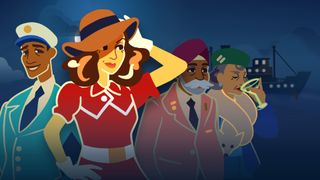
Overboard is a devilishly clever reverse murder mystery designed by Inkle, the studio behind 80 Days, Heaven's Vault, and other top-tier narrative games. In 1935, aboard a ship making its way from England to New York, Veronica Villensey murders her husband—and it's your job to help her get away with it by spinning a complex web of lies. It's one of the most unique narrative games I've played on PC, and one of our favourite games of the year so far.
It's a short, snappy story, but with countless interesting, hilarious, and dramatic permutations. If you want to know more, I wrote some impressions shortly after it was released. Remarkably, Inkle created the game in just a few months and launched it with no build-up or teasers. I spent some time with Jon Ingold and Joseph Humfrey, co-founders of Inkle, to talk about the design and writing of the project, and how it feels to surprise launch a game.
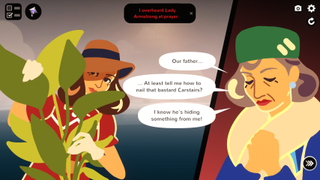
PC Gamer: Where did the idea for Overboard come from?
Jon Ingold: It was around January, winter was miserable, the world had just gone into lockdown again. Joe and I both have young kids, and the schools had opened and then closed again, and everyone was feeling like 'Oh, here we go again.' Then someone asked us, just idly, if we gave you enough money to make a game in a month, what would you do? And we said 'nothing' because that's a ridiculous question. But then later we thought, what could we make in a month?
I think it was Joe [Humfrey, Inkle co-founder] who suggested it would be good to do a game where you had to lie, then cover those lies up. And then the entire idea for Overboard just appeared overnight. I wrote the first lines of dialogue, where Veronica pushes her husband overboard then wakes up with the steward knocking on her door. I posted some Ink [Inkle's in-house narrative scripting language] into a Slack chat we'd set up for this random conversation of what we could make in a month. It sounded good, and we decided to go ahead with the project, just for fun.
"You can get loads done in a month if you have a kind of game jam attitude of building things fast and not engineering everything absolutely perfectly."
Joseph Humfrey
PC Gamer: How did you approach development knowing your time was much more limited than usual?
Joseph Humfrey: Everyone knows it's possible to create some kind of game experience in a weekend, because game james exist. If you think of it from that point of view, a month is forever. You can get loads done in a month if you have a kind of game jam attitude of building things fast and not engineering everything absolutely perfectly. It's all about getting the game up and running as quickly as possible.
The biggest gaming news, reviews and hardware deals
Keep up to date with the most important stories and the best deals, as picked by the PC Gamer team.
I know other developers who have taken this approach. If you can't make a functioning prototype in a week, the game likely doesn't have an elegant, hooky enough mechanic that you can demonstrate immediately. It's slightly different for a narrative game, but I think the same philosophy still applies, in that Jon did create this hooky narrative mechanic, and it was something we knew we could, and did, make.
Tom [Kail, senior developer] made a fully working version of the game in Unity, using Jon's Ink, within a few days. And the beautiful thing about that was that we could spend all the rest of our time on polish and art and just making it a really fun, seamless experience.
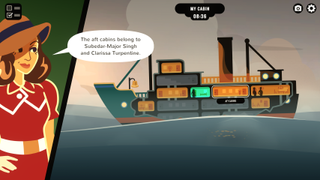
Jon Ingold: We've done a lot of games recently where we've been exploring something or trying to figure something out. How do you do an ancient language in Heaven's Vault, how do you do procedurally generated battles in Pendragon? It's really hard. Constantly, incredibly hard, and you never know if it's going to work or not. So part of the idea of making Overboard was to create something that we could just enjoy. The whole project, in a way, was making sure that everyone on the team was not doing anything apart from the stuff they really like doing.
We stole code from old projects whenever we could, because that's easier than writing new code. When we designed mechanics, we nicked them from things we'd done before. And when I was writing, I just wrote whatever the hell I felt like. If I wanted to throw in a stupid joke about God, I would. For the first draft of the graphic design, Joe suggested we just repeat the graphics from 80 Days. Normally we work with a composer for the music, which is really enjoyable. But he's having a baby right now, so we just took it all from public domain archives.
Annie [Wyatt, illustrator] is really good at characters and costume design, so let's give her a cast of crazy characters to draw, because that's what she likes. And let's not give her lots of furniture to draw, because that's a bit boring for her. Everybody was working at top speed on stuff they just love doing. You can't quite pull a game together like that. You have to do a bit of tedious stuff. There's coding and debugging, and obviously the graphic design evolved from just being a clone of 80 Days.
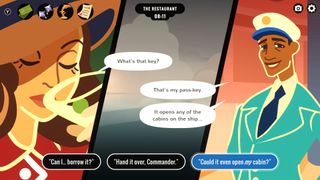
PC Gamer: How long did the game take to develop in the end?
Joseph Humfrey: It ended up taking about three and a half times longer than we expected to develop it. That's game development in a nutshell, really. You aim to make a game in a year and it takes three. We aimed to make a game in one month and it took three months.
Jon Ingold: We had a playable end-to-end version after about three weeks. It didn't have all of the content and no art at all, but it was enough to put it in front of testers. So we recorded playtests, which we never normally do, and that informed so much of the story and interface.
The one bit of design work we did was the fast forward mode. That arose from playtests. We needed to figure out how to do that in a heavily branching story. But we had time. No one was burned out yet, because building the rest of the game had been really fun.
"It was enjoyable making something with such a small scope, because we could be really meticulous with the interactivity."
Jon Ingold
PC Gamer: How does writing a narrative like this, taking place over just a few hours, compare to writing a larger story?
Jon Ingold: I've been wanting to do something like Overboard for ages, where absolutely everything Veronica does is driven by the player. There isn't a single action she takes on autopilot, apart from killing her husband at the very beginning. Everything else is up to you, and I don't think many games can say that, certainly not in the narrative space. Choosing exactly which lies you're going to tell, and to whom, is a much more interesting choice than just saving a guy or killing a guy, in the classic Mass Effect style. So it was enjoyable making something with such a small scope, because we could be really meticulous with the interactivity.
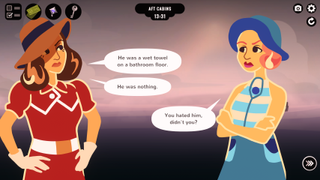
PC Gamer: Why did you decide to set the game in the 1930s?
Joseph Humfrey: When we were thinking about using stuff we already had, we considered setting Overboard in the 80 Days universe. Jon pushed back quite hard on that, because the steampunk elements wouldn't really make sense in this game. But we wanted to keep some of that feel. 80 Days is set in the 1800s, but we gave it an Art Deco style because we wanted to make it feel like that period's idea of futuristic. And we wanted to bring some of that Art Deco style to Overboard. It also made sense for the story to lean into the whole Agatha Christie, Poirot thing too.
Jon Ingold: The '30s also proved to be a good period of time for the setting, because you have an interesting political situation, and some fairly obvious villains, which is useful. The position of Britain in the 1930s is a country that's going quite badly wrong. The fascists are rising, people are protesting on the streets, there isn't enough food, there aren't enough jobs. And there are a lot of parallels between that and modern Britain. A process of social degradation coupled with an upper class who thinks everything is fine, and they just need more power and they'll fix everything.
"I feel like everything I'm writing at the moment is about fascism in some respects."
Jon Ingold
That's how the fascist party rose in the '30s, and it did eventually get defeated, but only by a whisker. And today we're not doing as well. I feel like everything I'm writing at the moment is about fascism in some respects. I wouldn't say Overboard was a massively political game, but it's not completely apolitical either. Also, [reaches off-camera and grabs a weighty-looking copy of The Thirties: An Intimate History of Britain by Juliet Gardiner] I read a lot of this.
It really gave me a sense of why Veronica was fighting as hard as she was, and what she was fighting for. She comes from a relatively poor background, she's close to getting into the aristocracy, but she's picked the wrong guy, and she really doesn't want to go back there. That sense of her knowing what Britain is like for people who aren't in the upper classes. It's not strongly resonated in the text, but it's there in her character about how it's fine for her to be murdering upper class people, because she knows the genuine cost of what's going on in the world, and they don't.
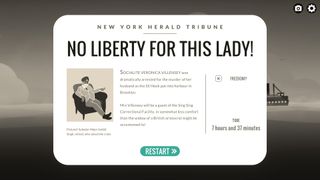
PC Gamer: The dialogue in Overboard has the snappy, organic feel of a real conversation. What's the secret to getting that right?
Jon Ingold: Conversations need to have pace, and when they do they are so fun. We love dialogue in stories, with banter and interplay. A lot of games fall into the trap of just being long exposition monologues about something, grand statements, or just barks with no context. That's never very interesting. For Overboard, I was really inspired by radio plays and radio comedies. It's all about the dialogue, and every time something is pithy or clever and lands well, it's just deeply pleasing.
I did a talk a couple of years ago [embedded below] that's quite widely watched by narrative designers, about writing sparkling dialogue. I had a scene from Blade Runner written as an interactive script, showing how it uses subtext, and how games often don't do subtext at all. I felt like a bit of a fraud doing that talk, because I definitely think about this stuff, and there's a bit of it in Heaven's Vault, but it always gets diluted by the game mechanics. So it was nice to do a game that was just this one idea. Let's make dialogue that really works, all the time.
Joseph Humfrey: As we were founding Inkle, we had to decide what the core things we do well would be. And one of them was the concept within interactive fiction of what we call micro-chunking—splitting up the content between choices, so it's super fine grain and you're present for every moment. And we definitely discovered early on that this feels really good in a dialogue context. You're constantly interacting.
We're also completely aware, and supportive actually, that players skim read. There's no getting around the fact that when you're in a text-based game, people will only pay attention to maybe 50% of the words. They glean a lot of the meaning from the choices they're presented with. This is something we saw going back to Sorcery. Players would read like 20% of the content of the words, but really pay attention to the choices. So if you reduce the number of words between the choices, the choices can really have an impact and communicate what's going on.
Jon Ingold: A lot of it is also writing to the shape of the interface. Early on we had a prototype with the speech bubbles in place, and they didn't look very nice, but we had the sense of the length and how many can be on screen at one time, and then you can write to that format. If a speech bubble gets too long people will glaze over it, so you make it nice and pithy. And if you want to develop an idea, you don't go off into a big speech—you add in some more choices and make it a little side branch. You can have long, engaging arguments with characters on this boat about the most random things, but we don't force the player to do it.
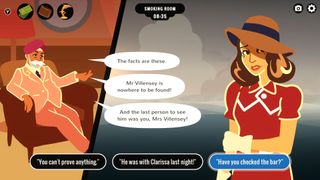
PC Gamer: Did you want players to feel conflicted about playing as a fairly unrepentant murderer?
Jon Ingold: That one's really weird for me. About three weeks into writing the story, someone asked me how we were going to make players empathise with this woman. And I said 'I don't understand the question. She's the protagonist.' But then I thought, oh yeah, you're right. I hadn't really thought of that, and I'm not sure why. I think it's that the character is just so much fun. She has so much verve and life, and the setup is so immediately enticing that I didn't even stop and think about the morality of it very much. And I don't think many players do either.
The game does a little bit of work to try and fill in some backstory about how the husband maybe wasn't a very good guy. And the final winning run is one in which Veronica does something altruistic, and that's nice, because it's a bit of a moral arc for her. But mostly the morality wasn't a problem, because it's just such a delightful setting to play with.
"The game does a little bit of work to try and fill in some backstory about how the husband maybe wasn't a very good guy."
Jon Ingold
There aren't boundaries in the game where you expect them to be. In the first draft you couldn't murder anyone, except maybe one character, and Tom said: 'The game's called Overboard, I want to push everyone overboard!' I said, no, that's too hard. But he insisted, and there was a week in the Slack channel where I was like 'Okay, you can murder this person now.' And by the end I managed to get them all.
PC Gamer: Why did you decide to surprise launch the game without any of the usual pre-release build-up?
Jon Ingold: Before launch we thought, we've made this game we really like, and we're gonna launch it on Twitter, and everyone's just gonna ignore it. It'll disappear and that'll be that. On the morning of the launch Joe asked how I was and I said 'This is a disaster! We're idiots!' And then launch happens, and we got this enormous bubble of positivity from the press, places like GOG and Nintendo who supported the release, other developers, and players. We didn't have to ask people to wishlist it, or any of that. The whole Steam algorithmic ecosystem is very depressing.
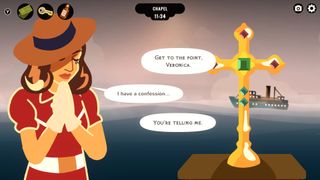
Joseph Humfrey: Very few developers actively enjoy the recommended process of announcing years ahead of time, producing animated gifs, doing social media, and all of that stuff throughout development. It's seen as an absolutely necessary thing to get the wishlists. So it was nice not having to do any of that, and just focus on what we enjoy, which is making games and putting them out there for people.
Jon Ingold: We could say 'Just go out and buy it. It's there. Don't bother wishlisting it.' And that's something you can't do with a big game, because it's too risky. But you can do it with a small game. We ended up on the front page of Steam because we managed to get enough wishlists on day zero and the algorithm flipped and decided we weren't garbage.
It was just lovely to have people's support, and people playing it immediately, because it was genuinely happening right now. It wasn't maybe going to happen in three weeks. I loved it... but I don't know if I want to do it again. It was really fun, and it went great, and I enjoyed not shilling for it. But it was a lot of work before launch that might've just gone in the bin, and I don't know if I could take that.
If it’s set in space, Andy will probably write about it. He loves sci-fi, adventure games, taking screenshots, Twin Peaks, weird sims, Alien: Isolation, and anything with a good story.
Most Popular


